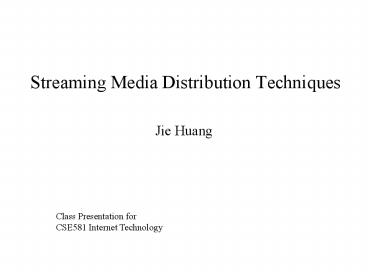Streaming Media Distribution Techniques - PowerPoint PPT Presentation
1 / 22
Title:
Streaming Media Distribution Techniques
Description:
Scalable On-Demand Media Streaming with Packet Loss Recovery ... Play time for segment i must be longer than the longest waiting time for the ... – PowerPoint PPT presentation
Number of Views:53
Avg rating:3.0/5.0
Title: Streaming Media Distribution Techniques
1
Streaming Media Distribution Techniques
- Jie Huang
Class Presentation for CSE581 Internet Technology
2
Papers
- Broadcasting on Isochronous channels
- Skyscraper Broadcasting A New Broadcasting
Scheme for Metropolitan Video-on-Demand
Systemsby Kien A. Hua and Simon Sheu, Univ. of
Central Florida - Scalable On-Demand Media Streaming with Packet
Loss Recoveryby Anirban Mahanti, Derek L. Eager,
Mary K. Vernon, and David Sundaram-Stukel, Univ.
of Saskatchewan and Univ. of Wisconsin - Caching in the Internet
- Caching Techniques for Streaming Multimedia over
the Internetby Markus Hofmann, T.S. Eugenne Ng,
Katherine Guo, Sanjoy Paul, and Hui Zhang, Bell
lab and Carnegie Mellon Univ.
3
Measurements for Video-on-Demand
- Server bandwidth
- Client bandwidth
- Client buffer space
- Startup Latency
4
Broadcasting Schemes
- Periodic Broadcast
- Server centered (server bandwidth)
- Pyramid Broadcasting (PB)
- Permutation-Based Pyramid Broadcasting (PPB)
- Skyscraper Broadcasting (SB)
- Reliable Periodic Broadcast (RPB)
- Bandwidth Skimming
- A client merging technique, client centered
(client bandwidth, startup latency) - Simple Bandwidth Skimming
- Reliable Bandwidth Skimming
5
Pyramid Broadcasting
1 a a2 a3
a4
Video 1
1
2
3
4
5
Video 2
1
2
3
4
5
Channel bandwidth
Server bandwidth
6
Pyramid Broadcasting (cont.)
- At the client side
- Download the next segment at the earliest
possible time after beginning to play the current
segment - Play time for segment i must be longer than the
longest waiting time for the start of segment i1 - At most two concurrent channels! Channel
bandwidth gt play rate - High network and disk bandwidth
- Large buffer, 70 of the length of the video
7
Permutation-based Pyramid Broadcasting
- Smaller transmission bandwidth reduces disk
bandwidth and space requirement - Large latency
- Number of channels is limited to 7
8
Skyscraper Broadcasting
1 2 2
5 5
Video 1
Video 2
Channel bandwidth play rate
Even group
Odd group
Server bandwidth
9
Skyscraper Broadcasting (cont.)
- At the client side
- Receiving segments in terms of transmission group
- A group consists of consecutive segments having
the same sizes - A group is downloaded in its entirety, in the
segment order
- At most two groups are being downloaded at the
same time - Maximum bandwidth requirement 2 play rate
- Maximum buffer space longest segment size
first segment size
10
Skyscraper Broadcasting (cont.)
- Segment size restriction
- No segments larger than W times the size of the
first segment - Small buffer space prefers small W
- (W-1) first segment size
- Low startup latency prefers large W
- large W means small first segment size
11
Skyscraper Broadcasting (cont.)
- Choosing W allows flexibility
- achieve latency of PB and buffer space of PPB
12
Reliable Periodic Broadcast
- Loss Recovery
- Digital Fountain loss recovery without
retransmission
Any four packets received
d
b
c
f
13
Reliable Periodic Broadcast (cont.)
- Each segment is delivered by an approximation of
a digital fountain - Receive an entire segment before playing it
- ! latency performance is competitive with
Skyscraper - Low latency comes from
- A client can begin receiving immediately
- The maximum possible segment size increase
- The client will receive an entire segment just in
time to begin playing it
14
Reliable Periodic Broadcast (cont.)
- Comparison with Skyscraper
- K total number of segments number of channels
available for a video sever bandwidth Kr - r segment transmission rate (in playback
rate) - s maximum number of streams clients listen to
- lk length of the kth segment relative to segment
1 - D video length (in playback time)
- D1 segment 1 length (in playback time)
- r 1, s 2 in Skyscraper, which makes the RPB
length progression a Fibonacci series.
15
Reliable Periodic Broadcast (cont.)
- Latency depends on D1
- SB D1/2
- RPB D1
- D1 D / Slk
- For a certain server bandwidth, K is fixed
- So D1 depends on how the segment sizes increase
16
Reliable Periodic Broadcast (cont.)
- Price of low latency
- Buffer size
17
Bandwidth Skimming
- Client merging a new client listens to its own
new stream as well as the most recently initiated
on-going stream that it can merge with.
18
Bandwidth Skimming (cont.)
- Emphasis on client bandwidth lt 2play rate
- e.g. client bandwidth 1.33play rate in 4
channels
19
Bandwidth Skimming (cont.)
- Reserve a small skim of client reception
bandwidth to support substantial reduction in
server and network bandwidth - Skim can be tuned to provide the trade-offs
between playback quality and required server
bandwidth
20
Reliable Bandwidth Skimming
- Divide the media stream into segments that have
fixed duration - Each segment is stretched using erasure codes
- For each segment, the server transmits a rate 1.0
primary stream and a rate p/(1-p) secondary
stream - The secondary stream is offset in time by the
segment duration - Merge secondary streams as well as the primary
streams
21
Caching Techniques for Streaming Media
- Segmentation of Streaming Objects
- rather than all-or-nothing
- Dynamic Caching
- like a ring buffer
- Self-organizing Cooperative Caching
- helper machines inside the network
22
Summary
- Broadcasting schemes
- Periodic Broadcast
- Pyramid Broadcasting (PB)
- Permutation-Based Pyramid Broadcasting (PPB)
- Skyscraper Broadcasting (SB)
- Reliable Periodic Broadcast (RPB)
- Bandwidth Skimming
- Simple Bandwidth Skimming
- Reliable Bandwidth Skimming
- Caching techniques for streaming media































